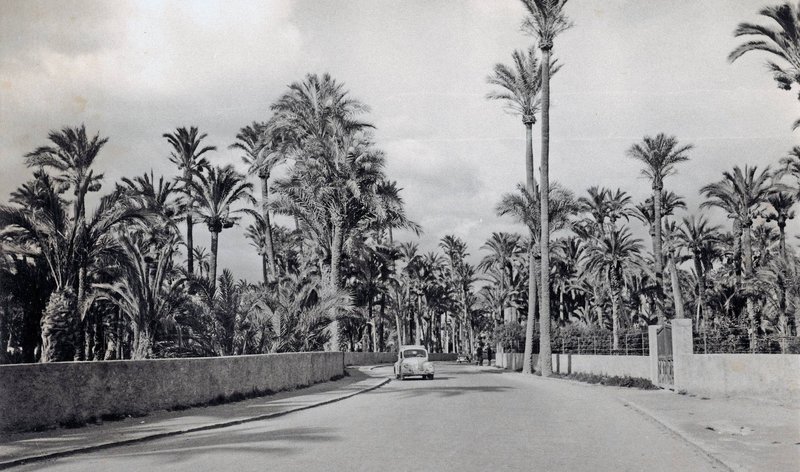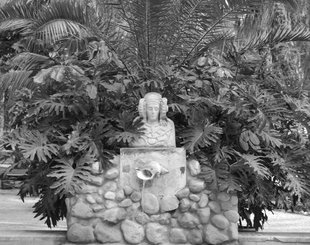A southern oasis
A prolific travel writer fascinated by all things exotic, waxes poetic about the delights of Elx.
The second day at Alicante was spent in an excursion to Elche, thirteen miles away, and famous for three special reasons; it was the original home of that wonderful bust now in the Louvre called “The Lady of Elche”, which experts date from about 440 B.C. This has been the admiration of all connoisseurs, and has been illustrated and written about many times.
The second reason why Elche is famous is for its remarkable palms; they lie all round the town, some one hundred and fifteen thousand fine trees with “their feet in the water, their heads in the fire of heaven”, as the Moorish saying has it. The town stands on a hill in the centre of this wonderful grove—squat, flat-roofed white houses huddled together round the blue-domed church at the top. From the roofs—indeed, from the streets of this hill town one has a strange view, groves upon groves of palms planted in avenues radiating out from the town, losing themselves in forests on the outskirts and finally fading away into what looks like a white desert, a dry arid plain stretching far into the distance. It is at once remarked that Elche is as truly an oasis as though it lay in the great Sahara. Between all the groves run streamlets of water, carefully controlled by an elaborate system of dykes and water-gates. Were it not for these, the desert would presumably eat up the oasis, but this is one of the few places where the irrigation of the Moors has been carefully preserved. Under these trees one finds the most luxuriant vegetation—laurel, arbutus, oleander and geraniums grow to great heights; camellias, heavy-scented tuberose and stephanotis flourish out of doors. The orange trees are among the finest in Spain, and here grows that delicious sugar cane orange which has such quantities of sweet scented juice. Wandering about these palm groves one can easily lose oneself, and it is a very strange and attractive place, utterly unlike anything else in Europe. The song of the women washing clothes in the river at the foot of the town drifts about the palm groves as a kind of echo and is re-echoed again by a still more typical eastern melody that at first I could not place at all. It seemed to come from the tops of the trees, which, indeed, it actually did. It turned out to be the old Moorish date-pickers' song, and we saw many of them up in the tops of the palm trees, sitting across the great leaves and gathering the ripe fruit, while mules with huge panniers waited below. I have been since told that this is same melody is still sung by the date-pickers in the oases of the Sahara.
The palms are looked after by special gardeners, and require very careful attention. The male palms flower in May, and the pollen is sprinkled by the gardeners over the female trees, which bear fruit only every other year, each tree yielding about eighty pounds of dates. This fruit, though sweet and delicious, is much smaller than the Sahara date. The palms at Elche are far more famous for their leaves than for their fruit. It is from them that those huge palm leaves come which are blessed by the bishops and are bought by every pious family in Spain to tie on to their balconies or on to the iron gratings of their windows. These blessed palms are supposed to protect the house from lightning, and one seldom sees a good house in Spain without one of these palms attached to some part of it. The leaves are bleached on the trees by being carefully bound up and all light excluded; each large tree is subjected to this treatment once in every four years.
The third attraction of Elche is a strange little Passion Play—the only one in Spain—which takes place every year on the Eve and Feast of the Assumption and is played in the church on the hill. It is a strange and primitive little play, in which the Holy Family, angels, apostles and innumerable saints take part. The robes and decorations are crude and vivid, and by a strange arrangement of mechanical ropes and chains these figures ascend and descend in the most astounding manner. We could make nothing of either the story or the music, but were told that it had been miraculously sent to Elche in a chest from the sea, which also contained the very old image of the Virgin now enshrined in one of the chapels. Legend has it that as long as the play is performed Elche's palm groves will flourish. If the play is given up Elche ceases to be an oasis and will be claimed by the desert again.




